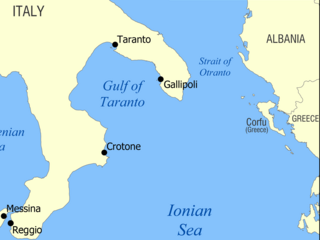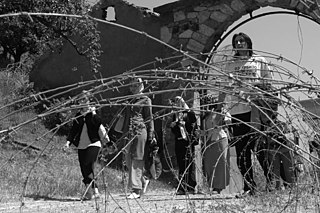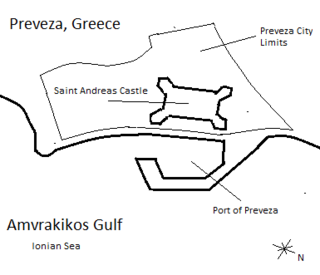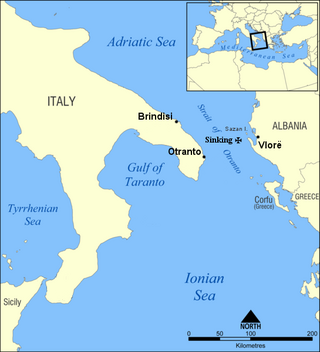Related Research Articles

The Kosovo War was an armed conflict in Kosovo that lasted from 28 February 1998 until 11 June 1999. It was fought between the forces of the Federal Republic of Yugoslavia,which controlled Kosovo before the war,and the Kosovo Albanian rebel group known as the Kosovo Liberation Army (KLA). The conflict ended when the North Atlantic Treaty Organization (NATO) intervened by beginning air strikes in March 1999 which resulted in Yugoslav forces withdrawing from Kosovo.

The Albanian Armed Forces are the military of Albania and were formed after the declaration of independence in 1912. Today,it consists of the General Staff,the Albanian Land Force,Albanian Air Force and the Albanian Naval Force.

The North Atlantic Treaty Organization (NATO) carried out an aerial bombing campaign against the Federal Republic of Yugoslavia during the Kosovo War. The air strikes lasted from 24 March 1999 to 10 June 1999. The bombings continued until an agreement was reached that led to the withdrawal of Yugoslav armed forces from Kosovo,and the establishment of the United Nations Interim Administration Mission in Kosovo,a UN peacekeeping mission in Kosovo. The official NATO operation code name was Operation Allied Force whereas the United States called it Operation Noble Anvil;in Yugoslavia the operation was incorrectly called Merciful Angel,possibly as a result of a misunderstanding or mistranslation.

The Kosovo Force (KFOR) is a NATO-led international peacekeeping force in Kosovo. Its operations are gradually reducing until Kosovo's Security Force,established in 2009,becomes self-sufficient.
Bashkim Fino was an Albanian socialist politician who served as the 29th Prime Minister of Albania from March to July 1997.

The Strait of Otranto connects the Adriatic Sea with the Ionian Sea and separates Italy from Albania. Its width at Punta Palascìa,east of Salento is less than 72 km. The strait is named after the Italian city of Otranto.

The 2004 unrest in Kosovo is the worst ethnic violence case in Kosovo since the end of the 1998–99 conflict. The violence erupted in the partitioned town of Kosovo Mitrovica,leaving hundreds wounded and at least 14 people dead. The unrest was precipitated by misleading reports in the Kosovo Albanian media which falsely claimed that three Kosovo Albanian boys had drowned after being chased into the Ibar River by a group of Kosovo Serbs. UN peacekeepers and NATO troops scrambled to contain a raging gun battle between Serbs and Albanians. Serbs call the event the March Pogrom,while the Albanians call it the March Unrest.

The 2006 East Timorese crisis began as a conflict between elements of the military of East Timor over discrimination within the military and expanded to a coup attempt and general violence throughout the country,centred in the capital Dili. The crisis prompted a military intervention by several other countries and led to the resignation of Prime Minister Mari Alkatiri.
In 1991,the Socialist Party of Albania,with specific social democratic ideology took control of the country through democratic elections. One year later the Democratic Party of Albania won the new elections. After 1990,Albania has been seeking a closer relationship with the West. What followed were deliberate programs of economic and democratic reform,but the implementation of capitalism led to the proliferation of pyramid schemes. Chaos in late 1996 to early 1997,as a result of the collapse of these pyramid schemes,alarmed the world and prompted the influx of international peacekeeping forces. In 1995,Albania was accepted into the Council of Europe and requested membership in NATO and is a potential candidate country for accession to the European Union. The workforce of Albania has continued to emigrate to Western countries,especially Greece and Italy.

The Adriatic campaign of World War II was a minor naval campaign fought during World War II between the Greek,Yugoslavian and Italian navies,the Kriegsmarine,and the Mediterranean squadrons of the United Kingdom,France,and the Yugoslav Partisan naval forces. Considered a somewhat insignificant part of the naval warfare in World War II,it nonetheless saw interesting developments,given the specificity of the Dalmatian coastline.
Operation Alba was a multinational peacekeeping force sent to Albania in 1997. Led by Italy,it was intended to help the Albanian government restore law and order during the Albanian Civil War.
In World War I,Albania had been an independent state,having gained independence from the Ottoman Empire,on 28 November 1912,following the First Balkan War. It was recognised by the Great Powers as the Principality of Albania,after Turkey officially renounced all its rights in May 1913. Being a fledgling new country,it quickly unravelled and just a few months after taking power,its German ruler,Prince Wilhelm,was forced to flee. After World War I broke out,anarchy took hold of the country as tribes and regions rebelled against central rule. To protect the Greek minority,Greek control was established in the southern districts replacing the Northern Epirote units beginning in October 1914. In response to this,Italy,although officially neutral at the time,also sent troops into the port of Vlorë,while Serbia and Montenegro took control of northern regions. In 1915 Serbia was overrun by combined German,Austro-Hungarian,and Bulgarian forces;the Serbian army retreated across the mountain passes of northern Albania,towards the Adriatic. Italian troops drove the Greeks from southern Albania and brought almost all Albanian territory under their control. Austrian forces invaded in June 1916;Austro-Hungarian forces remained in Albania until the end of the war when a multinational Allied force broke through and pushed them out in 1918.

The Battle of Preveza was the first naval engagement fought during the Italo-Turkish War,which took place in the Ionian Sea on 29–30 September 1911. The action took part in two separate engagements,the first off Preveza,and the second at Gomenítza the following day. Five Italian destroyers encountered a pair of Ottoman torpedo boats off the port of Preveza on 29 September and forced one aground;the second fled into the safety of Preveza. The next day,the Italian destroyers raided Gomenítza,where another two torpedo boats and an armed yacht were at anchor. The Italians sank both torpedo boats and seized the yacht as a prize.

On 6 April 2011,a boat carrying migrants from Libya to Italy sank 32 nautical miles south of Lampedusa and 96 nautical miles southwest of Malta. An emergency response involving the Italian Coast Guard resulted in the rescue of an initial 48 survivors and the retrieval of 20 bodies. A fishing boat picked up an additional three survivors. At least a further 130 people were not found after the shipwreck.

An incident took place on the Albania–Yugoslav border in April 1999 when the Yugoslav Army shelled several Albanian border towns around Krumë,Tropojë. In these villages,refugees were being housed after fleeing the ongoing war in Kosovo by crossing into Albania. On 13 April 1999,Yugoslav infantry entered Albanian territory to close off an area that was used by the KLA to stage attacks against Yugoslav targets.

The Tragedy of Otranto took place on 28 March 1997 when the Albanian ship Kateri i Radës sank in a collision with the Italian corvette Sibilla (F 558) in the Strait of Otranto and at least 84 Albanians,aged 3 months to 69 years,lost their lives. The emigrants had been part of a large migration of Albanians to Italy during the 1997 Albanian civil unrest,that began after the collapse of several large-scale pyramid schemes. To prevent the unauthorized entry of migrants into Italy,the Italian Navy set up a procedure to board Albanian vessels whenever encountered,implementing a de facto blockade.

Safet Zhulali was an Albanian politician who served as Defence Minister in the Meksi I &II Governments. He was a member of the Legislative Assembly from 1992 until 1997.
Sabit Brokaj was an Albanian politician,doctor,and professor. In 1991 Brokaj served as the Minister of Health of Albania.

The undefined borders of the Albanian state following the Treaty of London in 1913,made way for instability within Albania and the potential for her neighbours to claim certain sections of her yet to be defined lands. When the Kingdom of Serbs,Croats and Slovenes (Yugoslavia) decided to press claims to the lands in the North of Albania following a rebellion there,and escalated the situation by sending troops to the Albanian borders,war loomed on the horizon for both countries. Which encouraged the League of Nations to try and settle the situation in a peaceful manner.
References
- ↑ Perlez, Jane (15 March 1997). "Albania Chief's Associates Flee; Gunfire Halts Evacuation by U.S." New York Times . Retrieved 5 July 2016.
- 1 2 "Boat tragedy splits Italy over protection force". The Times. 2 April 1997.